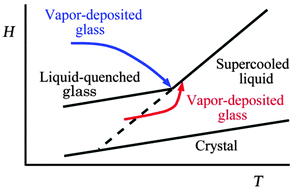Structural relaxation of vapor-deposited molecular glasses and supercooled liquids
Abstract
Molecular glasses prepared by vapor deposition have been revealed in recent years to have properties which the glasses prepared by ordinary liquid-quenching methods do not have. Thus the vapor-deposition method of material preparation has attracted increasing attention in the context of its possible application in manufacturing functional organic devices. The remarkable nature of vapor-deposited molecular glasses is that their properties depend very much on the deposition temperature and deposition rate. This suggests that the microscopic structure formed at the sample surface in the vapor deposition plays an important role in determining the sample properties. However, little of the structure of vapor-deposited molecular glasses has been clarified yet. In this article, we summarize first the research history of vapor-deposited molecular glasses, the concepts of amorphous solid and glass, and the methods for studying molecular glasses. We then summarize the research results reported to date for molecular glasses and related supercooled liquids. We also include in this article our recent research results in this field, and mention our present view on vapor-deposited molecular glasses.


 Please wait while we load your content...
Please wait while we load your content...